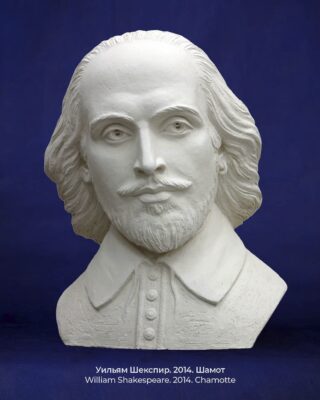William Shakespeare. 2015.
Author: Alexey Leonov
Material: Сhamotte
Location: "ETNOMIR" Cultural Education Center
“Ten times thy self were happier than thou art,
If ten of thine ten times refigured thee:
Then what could death do if thou shouldst depart,
Leaving thee living in posterity?”
William Shakespeare
1564-1616
english poet, playwright, writer, humanist
Shakespeare conveyed the movement of history, the turning point and the tragic contradictions of his time, turned to the most acute political problems, created unforgettably bright, many-sided characters. The works of Shakespeare lay down the origins of drama, lyrics and novel of the new time. He used the richness of the spoken language of the inhabitants of London, gave new shades to the words, attributed a new meaning to them.
The problem of man and history became the stem for his work. In the center of the plot of the majority of Shakespeare’s dramas is a personality that is revealed in the struggle taking place in the present. The national roots of Shakespeare are in that he lived by the interests of his time, he was faithful to the ideals of humanism, embodied the ethical principle in his works, drew images from the treasury of folk art, portrayed the heroes on a wide popular background.
WORKS The works that have come down to us, including some written in collaboration with other authors, consist of 38 plays, 154 sonnets, 4 poems and 3 epitaphs. Tragedies: “Titus Andronicus”, “Romeo and Juliet”, “The Tragedy of Julius Caesar”, “The Tragedy of Hamlet, Prince of Denmark”, “The Tragedy of Othello, the Moor of Venice”, “The Tragedy of King Lear”, “Macbeth” and others. Comedies: “All’s Well That Ends Well”, “The Comedy of Errors”, “The Taming of the Shrew”, “The Twelfth Night”, etc. Chronicles: “Henry IV”, “Richard III”, etc.




